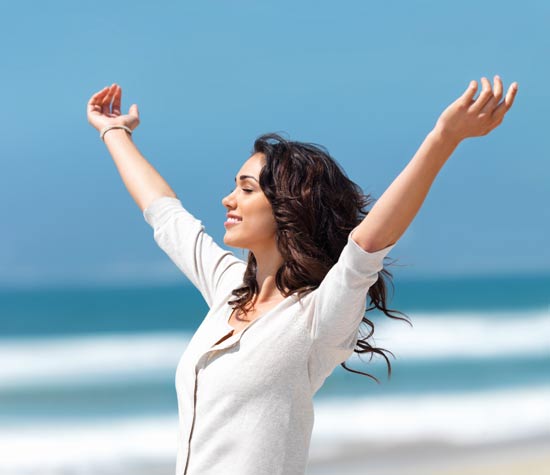Howard Knudsen owsn a Provo Physical Therapy clinic that provides non-traditional PT for chronic pain. He has been practicing for about 13 years.
Howard Knudsen has been providing provo physical therapy in a professional setting since 1998, and integrates several modalities for a unique treatment that is individualized to each client's needs. He provides therapeutic treatments by appointment in his Provo, Utah office: 801-310-0851.
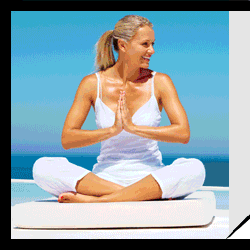
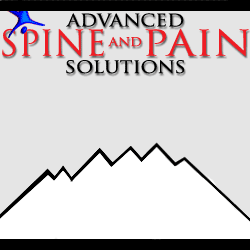
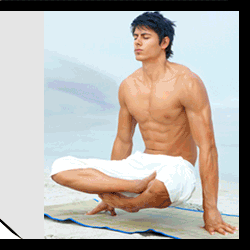
A Provo Physical Therapy Clinic
Feb 2011 Newsletter
Advanced Spine And Pain Solutions
Newsletter
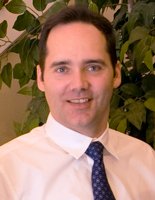 From: Dr. Howard Knudsen
From: Dr. Howard Knudsen
A Provo Physical Therapy Clinic Owner
Tuesday, March 2, 2011 at 10:19 PM
The New
AlterG
Anti-Gravity Treadmill
ISSUE 002
A Free Newsletter for the Friends and Patients of:
Dr. Howard Knudsen
GREETINGS!
Thank you for reading the second installment of my newsletter.
![]()
When I set out on a quest to find the "perfect strategy" to relieve my patients' pain I found a cure for my persistent back pain. I hope you can, too!
![]()
Contents
 Photo of the Month: Redwoods at Muirwoods
Photo of the Month: Redwoods at Muirwoods
 Health & Wellness Tip: Practicing IBA with SM&B
Health & Wellness Tip: Practicing IBA with SM&B
![]() What New? Our New Alter G Anti-Gravity Treadmill
What New? Our New Alter G Anti-Gravity Treadmill
![]() Success Story: Our New Alter G Anti-Gravity Treadmill
Success Story: Our New Alter G Anti-Gravity Treadmill
February Photo
Photo of the Month for January 2011
Photograph taken while on vacation with my wife in San Francisco at Muirwoods State Park. These redwoods are likely over 300 feet tall (some reach heights of 378 feet tall).
Health and Wellness Tip
Walking is an Important Key to Your Health
As we learned above, the AlterG can allow you to walk or run with less pain or pain-free. So, what's stopping you now from following the exercise guidelines that scientist have been recommending for years?
![]()
The Centers for Disease Control and Prevention recommendations:
Adults need at least:
A) 2 hours and 30 minutes of moderate-intensity aerobic activity (i.e., brisk walking) every week and
B) Weight training muscle-strengthening activities on 2 or more days a week that work all major muscle groups (legs, hips, back, abdomen, chest, shoulders, and arms).
![]()
More than 40 studies in the scientific literature document that cardiac risk can be reduced by 30 - 50% by regular, moderate exercise for 20 - 30 minutes at least five days a week.
![]()
Research indicates that walking 15 minutes a day three times a week may help decrease osteoarthritis pain by up to 40 percent.
![]()
A massive study (of over 5000 male subject spanning 30 years) shows that lung capacity determines longevity.
![]()
What's New
We just purchased a new

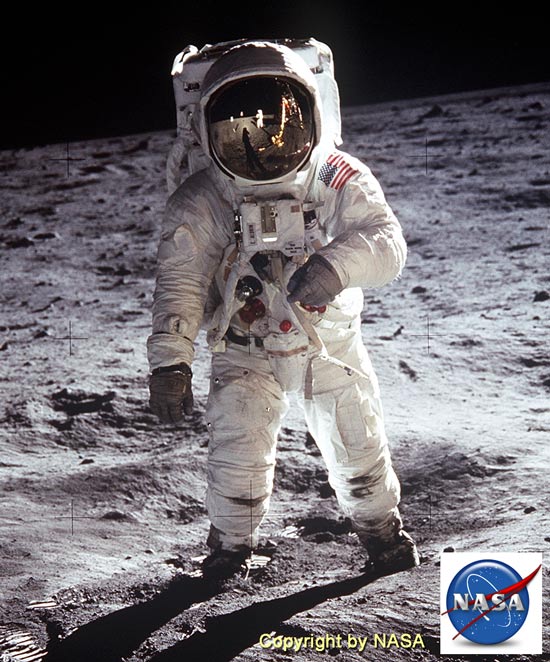
What is it?
The AlterG Anti-Gravity Treadmill was developed from NASA technology. It allows you to train or rehabilitate almost weightlessly, like you were walking on the moon.
If you experience pain in the lower back and/or legs while walking in Earth's gravity, then walking on the Moon's surface would likely be pain-free. The Moon's lower gravity would create a lower impact on your joints and less strain on your muscles and fascia.
Imagine taking a trip to the moon for your own moon walk. Do you remember the Apollo 11 moon landing in 1969? I was only a fetus at the time. Watch the video below.
What is an AlterG and what does it do?
An AlterG is a rehabilitation treadmill that is encased in a pressurized tent. The tent is made of the same material as a rubber river raft with see-through plastic windows.
An air-compressor inflates the tent to create a positive-pressure lifting force on the lower body.
A force plate (that works like a weight scales) is located beneath the treadmill. It measures your body weight so the computer can determine how much positive-pressure is required to create a lifting force to lower your body weight while walking or running on the treadmill.
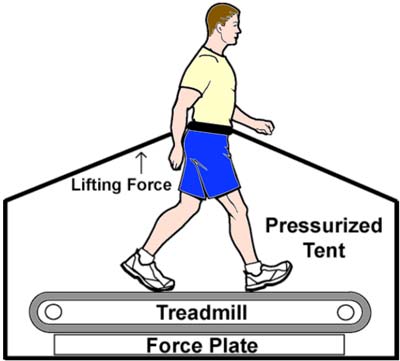
Lower-body positive-pressure treadmill.
Why is an AlterG a perfect rehabilitation device?
The scientific explanation is that the AlterG lowers a patient's Ground Reaction Force (GRF). What the heck is GRF?
The "lifting force" -- created by the pressurized tent -- lowers the GRF... which lowers the strain and compression that gravity places on your joints, fascia, and muscles.
In physics, and in particular in biomechanics, the GRF is the force exerted by the ground (or Earth) on a body in contact with it.
This follows Newton's Third Law of Motion, which states:
"For every action, there is an equal and opposite reaction."
In other words, if object A (your body) exerts a force on object B (the earth), then the earth (object B) also exerts an equal and opposite force (the GRF) on your body (object A).
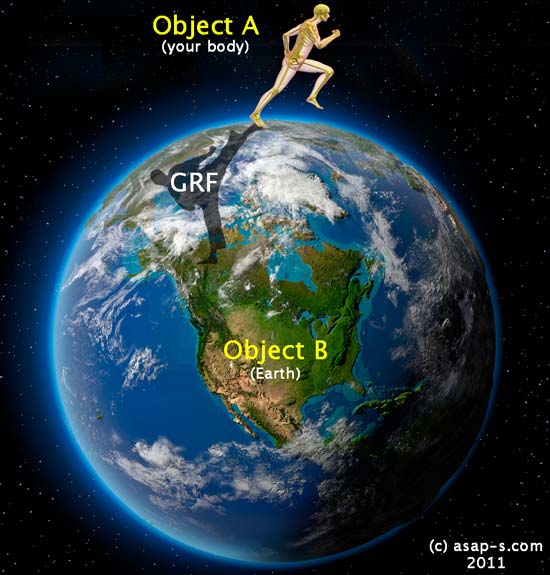
What does this mean?
It means that when your foot strikes the ground... the Earth "kicks" you back. And the impact of that "kick" travels up your leg to your spine.
Some of us can tolerate "the Earth's kick" while others cannot. If you have strained muscles or fascia, or if you have osteoarthritis and inflammation in your joints then running or even walking may be painful.
How much the Earth pushes back depends on how fast we are walking or running and how much we weigh.
When walking or running, our muscles generate the forces that push against the ground and the GRF propels us forward. Greater speed (velocity) requires greater push-off force, which creates greater GRF (which means the earth hits you back harder).
The AlterG treadmill allow you to:
1) burn calories,
2) work your lungs and heart, and
3) get your blood flowing to all of your body's cells.
Thereby you can promote health and wellness while manipulating the GRF (the Earth's kick that causes body pain) to extremely low levels.
Guess what? Now you can tolerate exercise again!
Who can AlterG help?
Pain, Orthopedic and Sports Medicine
Rehabilitation Patients
We can select from 20% of body weight to 100% in 1% increments, so patients can specify exactly where exercise becomes pain-free and progress can be easily tracked and charted.
People who are Dieting
Being over-weight can cause repetitive strain on ankle, knee, and hip joints, the sacroiliac joints, and the lumbar facet joints and discs. The AlterG treadmill is perfect for those that need to burn calories to lose weight but are finding it hard to exercise.
Senior Rehabilitation Strengthening and Conditioning (or those who are sedentary)
![]() Exercise at fractional body weights to overcome mobility challenges in older patients
Exercise at fractional body weights to overcome mobility challenges in older patients
![]() Promotes cardiovascular and musculoskeletal health in a safe environment
Promotes cardiovascular and musculoskeletal health in a safe environment
![]() Strengthening and improved coordination of muscles thereby protecting surrounding joints
Strengthening and improved coordination of muscles thereby protecting surrounding joints
![]() Builds confidence in senior patients for improved functional capacity
Builds confidence in senior patients for improved functional capacity
![]() May lower the risk of falling
May lower the risk of falling
Watch this short video about the Alter G.:
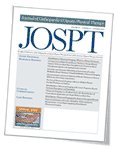 Study shows promising results for treatment of Low Back and Leg Pain with the AlterG anti-gravity treadmill
Study shows promising results for treatment of Low Back and Leg Pain with the AlterG anti-gravity treadmill
The results of a study in the Journal of Orthopedic and Sports Physical Therapy suggest that walking on a anti-gravity treadmill (combined with other physical therapy) for people with low back and/or leg pain holds promise for pain relief and functional improvement.
Here is one example of success with a current patient. I evaluated an 80+ year old patient a few days before I received my Alter G anti-gravity treadmill. I noted that she had a lung capacity problem so I tested her walking capacity on our treadmill.
She could only walk for 45 seconds before her pain was bad enough that she asked to stop and sit down. She also reported that pain normally restricted her walking to short distances.
It is likely that her inability to perform aerobic exercise because of back pain had led to diminished lung capacity (I measured it at 50% of normal with a Forced Vital Capacity test).
On her third visit (two days after our new Alter G arrived) I had her try unloaded walking. I set the body weight unloading to 60% (this is like losing 46 lbs from her normal weight of 115 lbs), and she was able to walk for 0.25 mile without back pain.
Why is this important?
To heal from chronic pain you must be in a healthy state. To be in a healthy state, your blood chemistry (which is the environment of the cells) must be healthy.
Proper breathing cleanses the blood as oxygen enters in and carbon dioxide (a waste-product of cell metabolism) is exhaled from the lungs.
Diminished lung capacity lowers the oxygen level in your blood (this is called anoxia) which leads to increase pain sensitivity and lactic acid build-up (muscle soreness).
Our goal is to increase this patient's lung capacity to 100% of normal and improve her ability walk longer distance without lower back pain.
Thought of the Day
Promoting Exercise by Utilizing the Fun Theory
Wellness Philosophy
Dr. Knudsen's Philosophy for
Relieving Persistent Pain
The following questions will help to summarize what I've learned on my quest to find the "perfect strategy." The perfect strategy begins with knowing the answers to these questions...
What is the key to long-lasting pain relief?
Focus on wellness to promote health and natural self-healing.
How?
Create an optimal environment (inside your body) for each and every one of your cells.
What do you mean by environment?
Our cells are bathed in blood. Therefore, blood chemistry is one of the keys to promoting health and reclaiming our body's natural ability to heal at the cellular level. The other factor is the energy state of the affected region of the body.
Please understand the following rule of health and natural self-healing:
The health of the cell is only as healthy as its environment.
What is required to promote a better environment?
1. Stop the hibitual release of stress-hormones into your bloodstream. This process is regulated by the brain. When stress-hormones are released too frequently it creates a toxic environment for your cells and organs.
2. Improve lung function: Every cell requires oxygen for metabolism and renewal. We also need to filter out waste (carbon dioxide) to cleanse the blood.
What actions are required to stop stress-hormone release?
Discover brain states that promote relaxation.
Correct mis-alignments of the spine and pelvic bones.
Stimulate myofascia remodeling to neutralize trigger points and other pain amplifiers with ASTYM, guasha, etc.
Promote optimal "inner body awareness" to more precisely connect mind and body.
Be present. Believe. Take responsibility.
Breathe right. Sleep right. Eat/drink right.
Align. Neutralize. Stimulate. Stabilize. Move.
How do you improve lung function?
A specialized program of Conscious Breathing exercises.
What is the overall theme of these actions?
Awakened doing.
What is the ultimate aim of changing brain activity?
Relax the nervous system (especially the primitive brain) to neutralize your pain sensitivity.
What went wrong to create conditions that promote persistent pain?
Chronic pain is maintained because nerve cells, muscle cells, collagan cells, neurons (brain cells), etc. are in an unhealthy and toxic environment. In such an environment unhealthy cells stay unhealthy. And, unhealthy patterns of brain activity along with a heightened state of nerve sensitivity are also maintained as a stress response. Pain amplifiers are created within the pain region to alarm us of the threat.
In regards to blood chemistry and working towards wellness, I have uncovered an activity that works for both the brain and the lungs. It is part of my "perfect strategy" that I use everyday called breathwalking.
What I practice may be described as "synchronized-moving-and-breathing" while maintaining inner-body-awareness. See more details in the following section.
Health and Wellness Tip
Practicing inner-body-awareness with synchronized-moving-and-breathing
SUMMARY: Five years ago I discovered "conscious breathing" as a way to jog longer distances without getting fatigued.
This started me on a path to become a breathwalk instructor. But I have to admit, that the original version of Breathwalk (which is mixed with religious worship) is SPOOKY to me! So I teach a modified version.
In 2005 I decided to "get back in shape" by jogging on a 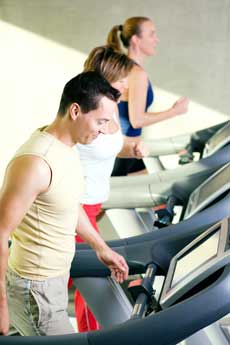 treadmill. At first I could only jog for about 5 minutes before feeling a strong desire to quit (because of fatigue). I didn't improve much over the next couple weeks (I was only up to 7 minutes).
treadmill. At first I could only jog for about 5 minutes before feeling a strong desire to quit (because of fatigue). I didn't improve much over the next couple weeks (I was only up to 7 minutes).
Then something remarkable happened! I decided to check my oxygen saturation with a pulse oximeter while jogging.
I noticed my oxygen level was dropping below 88% at the time that I had a strong urge to quit.
A thought came to me: "What if I consciously breathe more to keep the percentage higher?" 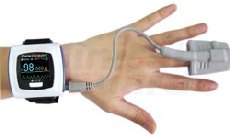
I attempted to consciously breathe to keep my oxygen-level above 96%. Soon I figured out the best breathing pattern for jogging.
By breathing more effectively I was able to jog longer distances. In fact, the duration jumped from 7 minutes to more than 35 minutes, almost from one day to the next. What's more... the only reason I stopped at 35 minutes was because I had an appointment to get to, not because of an urge to stop.
Three years later, my brother let me borrow an audio program he owned and I discovered another way to consciously breathe while walking.
Anthony Robins Version: Breathwalking
 Top-selling author and success guru Anthony Robbins, calls it "breathwalking" on his Get The Edge audio program. He has already eliminated all the "spooky" features as he knew they would not be palatable to his audience.
Top-selling author and success guru Anthony Robbins, calls it "breathwalking" on his Get The Edge audio program. He has already eliminated all the "spooky" features as he knew they would not be palatable to his audience.
I learned "breathwalking" from Tony while I was staying at a beach house in Mission Beach, San Diego. The best place to do these synchronized moving and breathing exercises is when you are surrounded by the wonders of nature; what more do you need for inspiration!
Listening to Tony's instructions, I walked along the beach, trying not to worry that someone would see me and think I was crazy. It might look strange at first glance as you "sniff" in and "puff" out segmentally in 4-parts each ("sniff... sniff... sniff... sniff" (on the inhale) then, "puff... puff... puff.. puff" (on the exhale) as you synchronize the footsteps with each unit of breath.
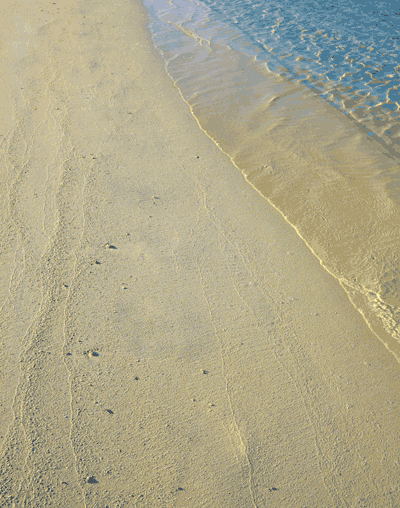
He also taught me to recite "incantations" (as an alternative to the "puffs" during exhalation), like:
"Everyday, in every way...
I'm getting better and better, yes!"
I have been doing a modified version of the Anthony Robins' "breathwalking" exercises for two and a half years almost every day and I have to say I am getting profound results. It is the foundation of my exercise program and I wouldn't want to start a work day without it.
As a previous "strongman" on a Junior College football team that is saying a lot. When I was at Snow College I bench pressed 235-pounds for 27 repetitions. I refer to this only to suggest that walking -- as an exercise -- was not something I would do if I didn't see profound results.
When I got home from my week-long vacation in San Diego, I googled breathwalking and found a website of the yogis who developed the program.
One week later, I was at a workshop in Salt Lake City at the University of Utah, along with seven other attendees (one was a professor of psychology and another was a physical therapist) to become a certified Breathwalk ® instructor.
Bonus
Free photo for past and present patients
Patients: The photos are ready. Please let us know which one you wanted and when you will be by to pick your ph oto up from our clinic.
Give us a call:
801-310-0851
Thank You!
P.S. Become a fan on our facebook page.
